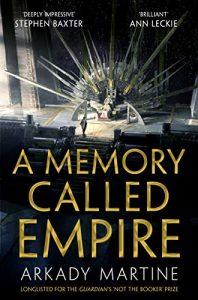
A Memory Called Empire by Arkady Martine is an elegant space opera that artfully ties together themes of empire, identity, and cultural dominance. It makes you consider all of these while drawing you into the characters and the complex political intrigues.
The book follows Mahit Dzmare, a newly appointed ambassador to the powerful, galactic spanning Teixcalaanli Empire after the mysterious death of her predecessor. She represents Lsel Station: a few space stations on the edge of Teixcalaanli space, containing some tens of thousands of humans. With such a small population, they use a device called an Imago that allows them to access the memories of their predecessor, eventually merging to become a single entity. The previous ambassador's Imago is decades out of date, however, and she has trouble working it besides. As a result she has difficulties navigating the physical, social, and political landscapes of the Teixcalaanli imperial court-all of which present dangers aplenty.
Mahit, like her predecessor before her, is in love with the culture of the Empire. Their culture (in the form of stories, language, and even modes and forms of thinking) is as much a tool of their domination of the known galaxy as their unstoppable fleets. I feel like the dedication at the beginning sums this up beautifully: "This book is dedicated to anyone who has ever fallen in love with a culture that was devouring their own." Mahit seems caught in the conflicted state of being a foreigner who wishes she were Teixcalaanli, while also being a lover of Teixcalaan that wishes to protect her station from the Empire. These conflicts are a constant theme throughout this book.
The culture of Teixcalaan itself deserves special mention. Arkady Martine has a PhD in history with a focus on the Byzantine Empire as well a Master's degree in Urban Planning, and it shows in how believably intricate the Teixcalaali Empire is. The empire seems to draw inspiration from the Byzantine, Aztec, and Chinese empires, but overall it feels wholly unique. The most prevalent feature of their culture is the obsession with literary works, both the words and the content of the stories themselves. The average Teixcalaanli seems to constantly reference stories and poems in their everyday speech, and two separate poems become strongly relevant to the progression of the plot. This probably sounds like it would overwhelm the reader as much as it does Mahit, but the author does an amazing job at grounding you in the context of the Empire. As you read through the little blurbs from in universe written works that begin each chapter, you really start to feel immersed in the culture.
The sapphic content in this book is limited, but on reread there are many more clues than I initially caught. It is a cute love story, even though romance has a relatively minor impact on the plot. The relationship does develop somewhat in the sequel, however, and I'm eagerly looking forward to where things go in the third book.
As an aside, this book has some surprising parallels to both the Machineries of Empire series by Yoon Ha Lee and the Imperial Radch series by Ann Leckie. If you enjoyed either, I'd recommend this book wholeheartedly, as well as vice versa (though the Imperial Radch is definitely my least favorite of the three-certainly good, but not as incredible as the other two). All feature characters grappling with existing inside oppressive empires, and all explore fascinating ideas regarding identity. (Oddly enough, all also involve the merging or splitting of consciousnesses).
Lastly, I want to praise how clever this book is overall. The plots are intricate and everything is tied together beautifully, of course, but it's more than that. The use of language, both within the dialogue and without, is precise and brilliant. By the end you get a sense of the characters and how they think-almost entirely alien to us in a believable way. You come away feeling satisfied and clever for having understood it.
